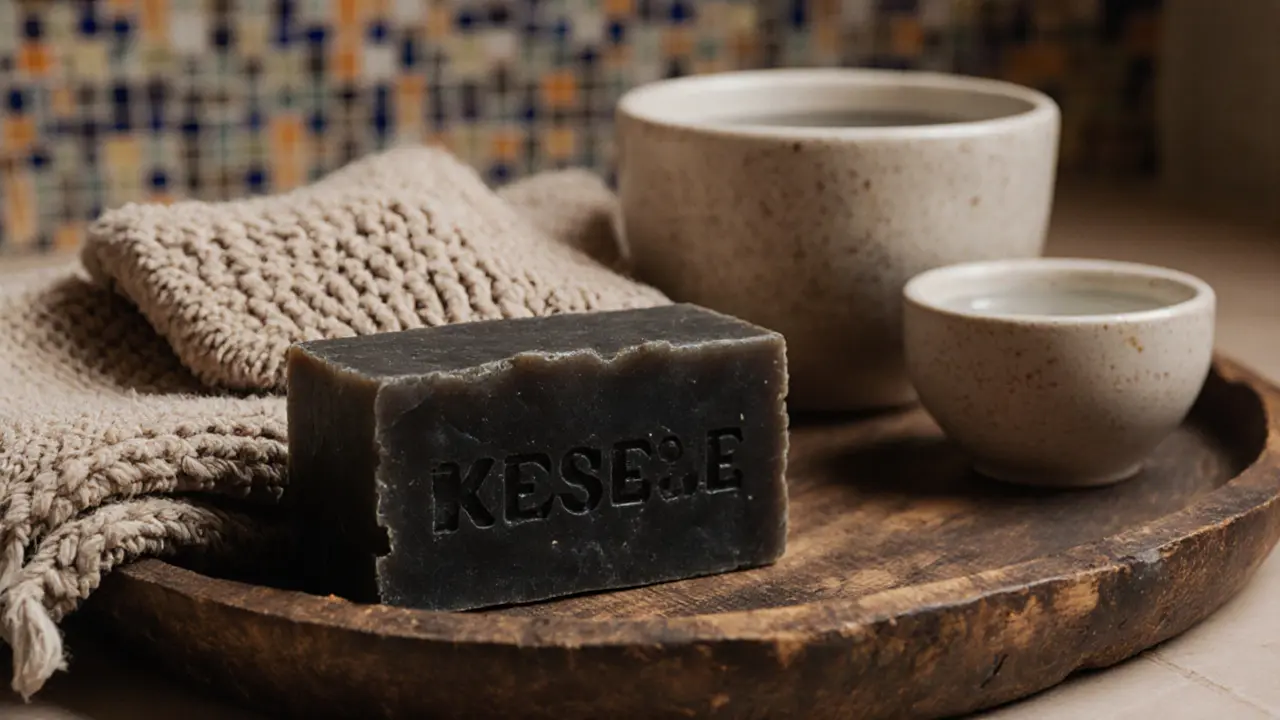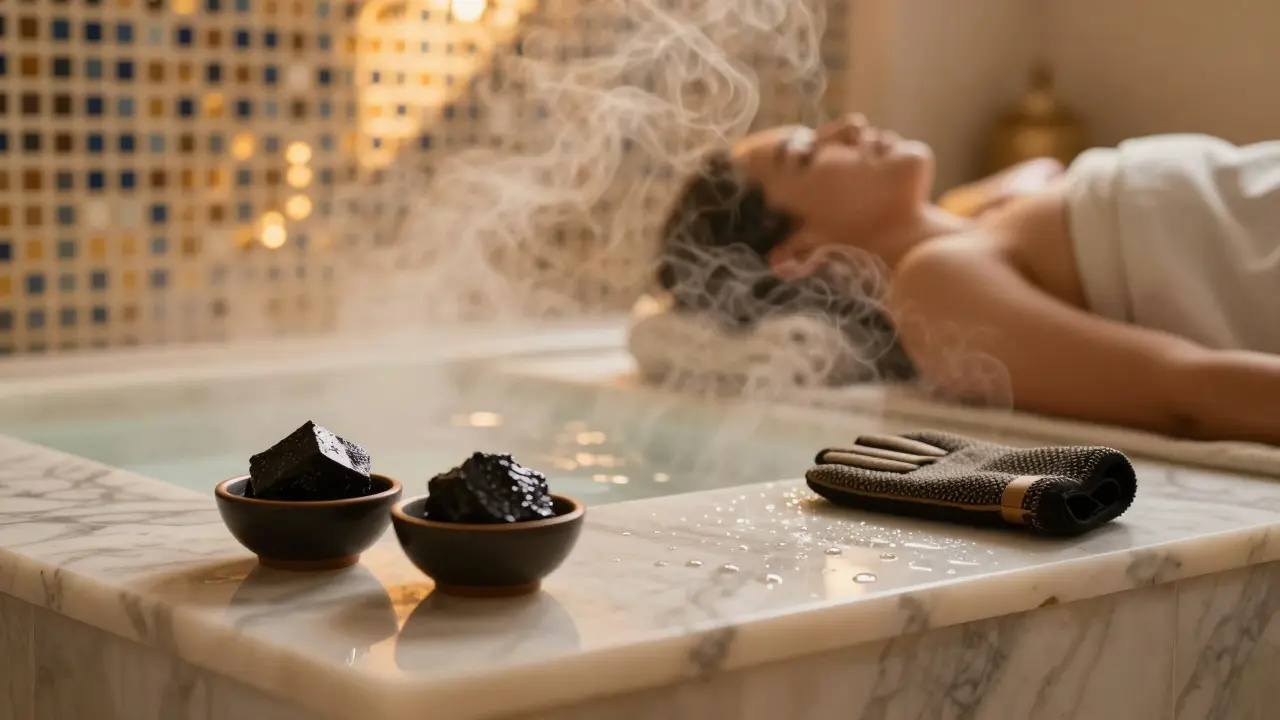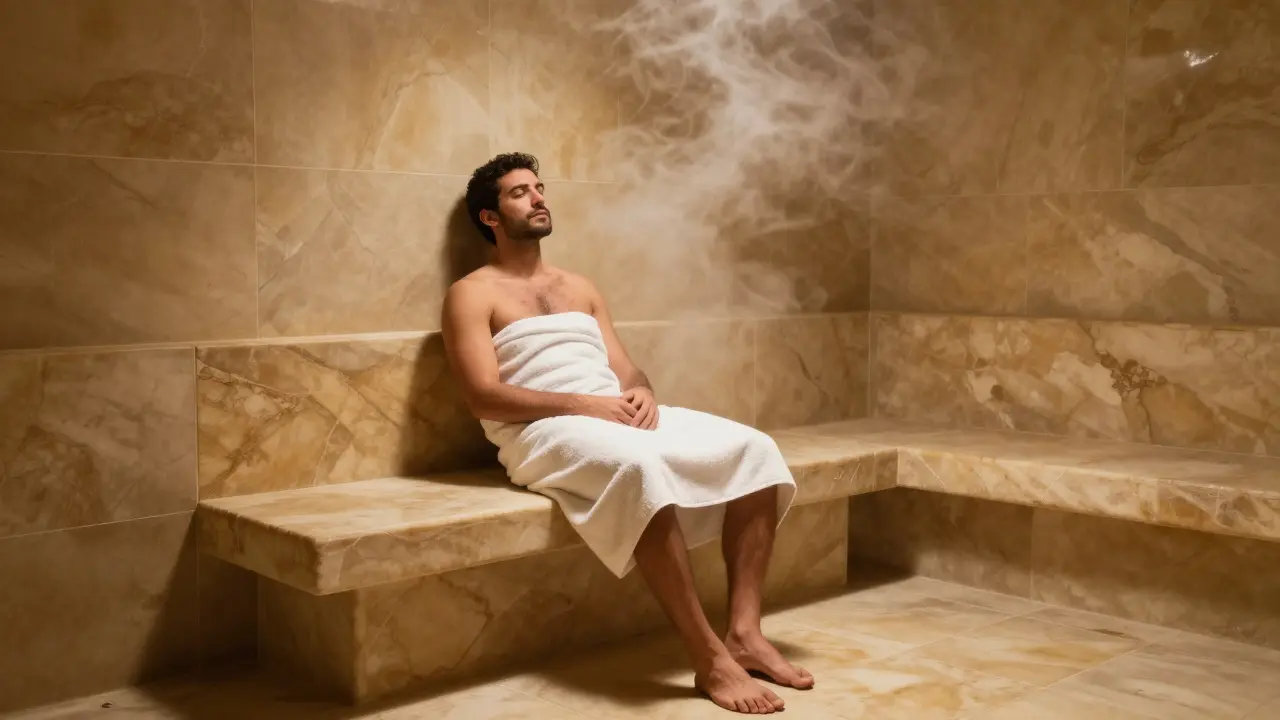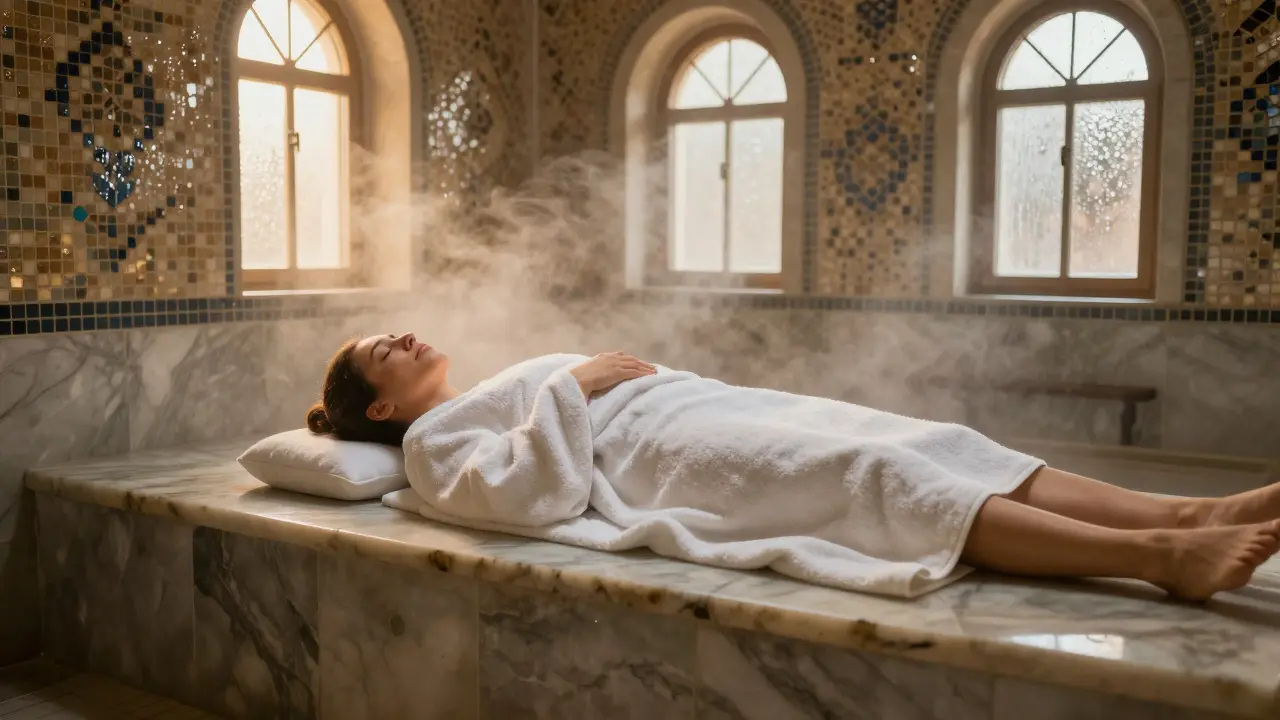When you step out of a hammam in Dubai, your skin feels like silk, your muscles are loose, and your mind is quiet. But if you rush into the next thing-jumping into cold water, slapping on perfume, or heading straight to the sun-you’re undoing all the good work. The hammam isn’t just a bath; it’s a ritual. And like any ritual, how you end it matters just as much as how you begin it.
Understanding the Basics of Hammam
Origins and History
The hammam, or Turkish bath, traces its roots back to Roman thermae and evolved through Islamic culture into the Moroccan version you find today in Dubai. It’s more than steam and scrubbing-it’s a social, spiritual, and physical cleanse. In traditional settings, families would gather weekly for the ritual, using black soap made from olive oil and kese gloves to exfoliate. In modern Dubai, you’ll find luxury spas that blend this ancient practice with contemporary comforts, but the core principles remain unchanged: heat opens, scrubbing removes, and rest restores.
Core Principles or Components
A proper hammam session has three phases: heat, cleanse, and cool-down. The hot room opens your pores and loosens toxins. The scrub with black soap and a kese glove pulls away dead skin and impurities. Then comes the rinse and, most importantly, the quiet recovery. This final phase lets your body regulate temperature, rehydrate, and absorb the benefits. Skipping or rushing this stage is like finishing a workout and immediately running another mile-you’re not helping yourself.
How It Differs from Related Practices
Many people confuse hammam with saunas or steam rooms. While they all involve heat, hammam is a full-body treatment with active exfoliation. A sauna heats you passively; a hammam makes you sweat, scrub, and then rest. Compared to a regular spa shower, hammam includes ritualized cleansing and requires time to recover. Here’s how they stack up:
| Practice | Key Feature | Primary Benefit |
|---|---|---|
| Hammam | Steam + scrub + rinse + rest | Deep exfoliation and detox |
| Sauna | Dry heat, no scrubbing | Relaxation and circulation |
| Steam Room | Moist heat, no active cleansing | Respiratory relief and hydration |
Who Can Benefit from Hammam?
Almost anyone can benefit-from athletes needing muscle recovery to busy professionals looking to reset. People with dry or acne-prone skin often see dramatic improvement. But if you have sensitive skin, open wounds, or cardiovascular issues, you should consult a doctor first. In Dubai’s dry climate, the hammam is especially valuable for restoring skin moisture and balance after days of air-conditioning and sun exposure.
What Not to Do After a Hammam
Don’t Jump Into Cold Water Immediately
Your body is hot, your pores are wide open, and your blood is flowing fast. Jumping into a cold pool or shower right after can shock your system. It might feel refreshing, but it causes your blood vessels to snap shut, trapping toxins inside and undoing the detox. Instead, let your body cool naturally. Sit in the lounge area, sip mint tea, and let your temperature drop slowly. Think of it like letting a hot pan cool on the counter instead of plunging it into ice water.
Avoid Perfume, Alcohol-Based Products, or Heavy Lotions
Your skin just shed its outer layer. It’s fresh, sensitive, and ready to absorb. Slathering on perfume, aftershave, or thick creams with alcohol or synthetic fragrances is like putting makeup on a sunburn. You’ll irritate your skin and clog the pores you just cleaned out. Wait at least 4-6 hours before applying anything strong. If you need moisture, use pure aloe vera gel or cold-pressed oils like argan or jojoba-gentle, natural, and nourishing.
Don’t Head Straight Into the Sun or Air Conditioning
Dubai’s heat is intense, and the AC inside malls is freezing. After a hammam, your skin is vulnerable. Direct sun can cause redness or burns, even if you don’t feel sunburned. Cold AC drafts can trigger chills or headaches because your body is still regulating. Give yourself at least 30 minutes to recover indoors, ideally in a quiet, shaded space. If you’re heading out, wear loose, breathable cotton and carry a light scarf to cover your shoulders.
Don’t Drink Alcohol or Caffeine Right After
The hammam dehydrates you-even if you don’t feel it. Alcohol and caffeine are diuretics. Drinking them right after your session pulls even more water from your body, leading to dizziness, fatigue, or worse, heat exhaustion. Instead, drink room-temperature water with lemon or herbal tea. Coconut water is a great natural option too. Your body needs hydration, not stimulation, to recover properly.
Don’t Rush Back to Work or Social Media
This is the most overlooked mistake. The hammam isn’t just for your skin-it’s for your mind. You’ve entered a state of calm. If you immediately check emails, scroll through Instagram, or jump into a meeting, you’re breaking the mental reset. Take 15-20 minutes to sit quietly. Breathe. Let your thoughts settle. Many Dubai spas now offer quiet lounges with calming music and herbal teas for this exact reason. Don’t waste the gift of stillness.

What You Should Do Instead
Hydrate Slowly and Mindfully
Drink water in small sips over the next hour. Don’t chug. Your body absorbs it better that way. Add a slice of lemon or cucumber for electrolytes. Avoid sugary drinks-they spike your blood sugar and undo the calming effect.
Use Light, Natural Moisturizers
After 4-6 hours, apply a thin layer of pure argan oil or aloe vera gel. These are traditional in Moroccan culture for post-hammam care. They lock in moisture without clogging pores. Avoid anything with parabens, sulfates, or synthetic fragrances.
Rest and Recharge
Take a nap. Read a book. Walk slowly in a garden. Let your body recover. The benefits of the hammam-clear skin, reduced stress, better sleep-come from this quiet recovery phase. Pushing through your day right after defeats the purpose.
Wait Before Exercising
Your muscles are relaxed, your circulation is high. If you jump into a workout, you risk overexertion or injury. Wait at least 6-8 hours before intense exercise. A gentle walk or yoga is fine, but save the weights or HIIT for later.
Enhancing Your Experience
Add Complementary Practices
Pair your hammam with mindfulness. Try 5 minutes of deep breathing after your session. Or sip chamomile tea while listening to soft music. These small habits deepen the relaxation and make the benefits last longer.
Use the Right Tools
If you do hammam at home, invest in a good kese glove and authentic Moroccan black soap. These aren’t luxury items-they’re essential. A soft towel and a quiet space are all you need beyond that.

FAQ: Common Questions About Hammam Aftercare
What happens to your skin after a hammam?
After a hammam, your skin is freshly exfoliated and glowing. Dead cells are removed, pores are unclogged, and circulation is boosted. This makes your skin more receptive to moisture. But it’s also more sensitive. That’s why you should avoid harsh products and sun exposure for several hours. Many people notice their skin feels softer and looks brighter the next day-but only if they follow proper aftercare.
How long should I wait before showering after a hammam?
You don’t need to shower again after a hammam-it’s already a full cleanse. If you feel sticky, rinse gently with lukewarm water, but don’t use soap. Your skin is still absorbing the benefits. Wait at least 30 minutes before any water contact. If you’re in a hurry, pat dry gently with a soft towel and skip rinsing altogether. Let your skin breathe.
Is it okay to use a sauna after a hammam?
No. Doing a sauna right after a hammam overloads your system. You’ve already been in heat, scrubbed your skin, and flushed toxins. Adding more heat can lead to dizziness, dehydration, or even fainting. If you want to combine therapies, do them on separate days. Let your body recover fully between sessions.
Can I wear makeup after a hammam?
Wait at least 6-8 hours. Your skin is like a blank canvas after exfoliation. Makeup, especially foundation or powder, can clog pores and cause breakouts. If you must wear makeup, use a mineral-based product and apply it lightly. But the best option? Let your skin breathe. You’ll look more radiant without it.
Why do I feel tired after a hammam?
Feeling tired is normal. The hammam activates your parasympathetic nervous system-the part that helps you rest and digest. Your body is working hard to detox and heal. That takes energy. Don’t fight it. Rest. Nap. Let yourself recover. This tiredness is a sign your body is healing, not malfunctioning.
Conclusion: Why Hammam Aftercare Matters
A Path to Radiant Skin and Calm Mind
The hammam isn’t just a luxury-it’s a reset button for your body and mind. But the magic doesn’t end when you leave the steam room. What you do next determines whether you wake up glowing… or drained and irritated. The right aftercare turns a great experience into a lasting transformation.
Try It Mindfully
Next time you visit a hammam in Dubai, treat it like a sacred ritual. Slow down. Listen to your body. Skip the phone. Skip the perfume. Skip the rush. You’ll leave not just clean, but truly renewed.
Share Your Journey
Tried a hammam in Dubai? What’s your post-bath routine? Share your tips in the comments-we’re always learning from each other.
Some links may be affiliate links, but all recommendations are based on research and quality.
Word count: 1,682
Suggested Images
- A person relaxing in a quiet hammam lounge with mint tea and soft lighting
- Closer view of a kese glove and Moroccan black soap on a wooden tray
- Woman with glowing skin after hammam, wearing a cotton robe, sitting in natural light
- Steam rising from a traditional Moroccan hammam room with mosaic tiles
- Hand holding a glass of coconut water with lemon slices beside a towel
Suggested Tables
- Comparison of Hammam vs. Sauna vs. Steam Room (already included)
- Post-Hammam Do’s and Don’ts (Do: Hydrate, rest, use natural oils | Don’t: Use perfume, sun exposure, alcohol)
- Best Natural Products for Post-Hammam Skin (Argan oil, aloe vera, jojoba oil, chamomile tea)





Stephen Bodio
November 2, 2025 AT 07:46I went to a hammam in Jumeirah last week and totally blew the aftercare. Jumped into the pool like a maniac and regretted it for hours. My skin felt tight and weird the next day. Learned my lesson the hard way. Now I just sit with mint tea and stare at the tiles like a zen monk. Best 20 minutes of my week.
Also, no perfume. Ever. I learned that the hard way too.
Megan Garfio
November 2, 2025 AT 16:45YES. The no-perfume rule is life-changing. I used to slather on my favorite floral spray after and wonder why I broke out. Then I tried just argan oil and my skin has never looked better. Glow city. 🌟
Christopher McDonnell
November 4, 2025 AT 12:25Great post. Really nailed the mental part too. Most people think hammam is just about skin, but it’s the quiet after that makes it sacred. I’ve started leaving my phone in my locker and just breathing. Feels like a mini-vacation for the soul.
Also, coconut water is magic. Better than any sports drink.
Larry Zink
November 6, 2025 AT 10:41Technically, the phrase 'you’re undoing all the good work' is a dangling modifier - it should be 'you’re undoing all the good that has been done.' Also, 'kese glove' should be hyphenated as 'kese-glove' when used attributively. And please, for the love of grammar, capitalize 'Turkish bath' when referring to the proper noun form. This article is otherwise well-researched, but the punctuation errors are distracting.
Dipraj Ghosh
November 7, 2025 AT 14:56In India, we have similar traditions with the naturopathic bath rituals in Ayurveda - steam, herbal scrubs, and slow cooling. The principle is the same: don’t shock the system. I appreciate how this post connects ancient wisdom with modern life in Dubai. Many people forget that wellness isn’t about speed - it’s about rhythm.
Also, the point about avoiding social media? Spot on. We think we’re resting, but we’re just scrolling. That’s not recovery - that’s digital noise.
Cindy Vo
November 9, 2025 AT 14:11Ugh, I’m so tired of people treating hammams like they’re just ‘another spa thing.’ It’s not a spa - it’s a sacred, centuries-old ritual steeped in Sufi mysticism and Ottoman cosmology. If you’re just popping in for a ‘self-care’ Instagram post, you’re missing the entire point. You need to meditate before, chant during, and fast for two hours after. Otherwise, you’re just a tourist with a towel.
And please - if you’re using jojoba oil, make sure it’s cold-pressed, organic, and sourced from Palestinian farmers. Otherwise, you’re complicit in cultural appropriation.
Lauren Gibson
November 10, 2025 AT 14:04I used to be the person who rushed out after a hammam to catch a meeting. Then I started doing the quiet part - just sitting, no phone, no talk. After a week, I noticed I was calmer all day. Not just after the bath - all day. Like my nervous system finally remembered how to chill.
It’s not about the oil or the tea. It’s about giving yourself permission to be still. That’s the real luxury.
Also, nap after. Always nap.
Claire Feterl
November 10, 2025 AT 23:20While the article presents a compelling narrative regarding post-hammam care, it lacks empirical validation. No citations are provided for the claim that 'jumping into cold water traps toxins inside the body,' nor is there any peer-reviewed study referenced to support the assertion that 'alcohol and caffeine are diuretics that exacerbate dehydration following heat exposure.' Furthermore, the assertion that 'your skin is like a blank canvas' is a metaphorical oversimplification that misrepresents the biological complexity of epidermal regeneration. The absence of scientific rigor undermines the credibility of what is otherwise a well-structured exposition. Additionally, the use of emotive language such as 'sacred ritual' and 'gift of stillness' borders on pseudoscientific spiritualization, which, while emotionally resonant, does not constitute evidence-based health guidance. A more responsible article would include references to dermatological literature, physiological studies on thermoregulation, and clinical guidelines for post-heat exposure protocols.